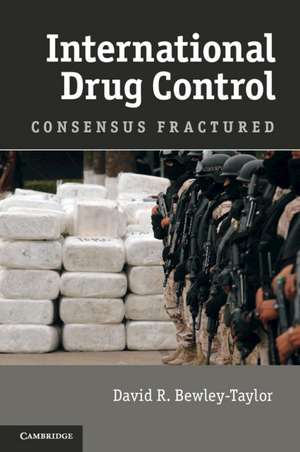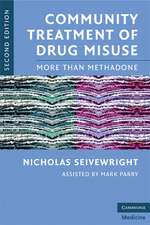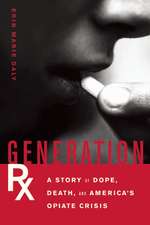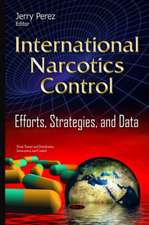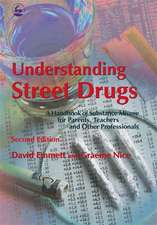International Drug Control: Consensus Fractured
Autor David R. Bewley-Tayloren Limba Engleză Hardback – 21 mar 2012
| Toate formatele și edițiile | Preț | Express |
|---|---|---|
| Paperback (1) | 243.53 lei 6-8 săpt. | |
| Cambridge University Press – 21 mar 2012 | 243.53 lei 6-8 săpt. | |
| Hardback (1) | 773.70 lei 6-8 săpt. | |
| Cambridge University Press – 21 mar 2012 | 773.70 lei 6-8 săpt. |
Preț: 773.70 lei
Preț vechi: 899.65 lei
-14% Nou
Puncte Express: 1161
Preț estimativ în valută:
148.06€ • 160.78$ • 124.37£
148.06€ • 160.78$ • 124.37£
Carte tipărită la comandă
Livrare economică 23 aprilie-07 mai
Preluare comenzi: 021 569.72.76
Specificații
ISBN-13: 9781107014978
ISBN-10: 1107014972
Pagini: 360
Ilustrații: 1 b/w illus. 2 maps 4 tables
Dimensiuni: 157 x 234 x 20 mm
Greutate: 0.68 kg
Ediția:New.
Editura: Cambridge University Press
Colecția Cambridge University Press
Locul publicării:New York, United States
ISBN-10: 1107014972
Pagini: 360
Ilustrații: 1 b/w illus. 2 maps 4 tables
Dimensiuni: 157 x 234 x 20 mm
Greutate: 0.68 kg
Ediția:New.
Editura: Cambridge University Press
Colecția Cambridge University Press
Locul publicării:New York, United States
Cuprins
1. Introduction; 2. Soft defection and the domestic normalization of harm reduction; 3. Harm reduction at the UN: member state tension and systemic dissonance; 4. Cannabis, soft defection and regime weakening; 5. Defending the regime: the International Narcotics Control Board; 6. Beyond regime weakening? Lessons from the UNGASS decade.
Recenzii
'This book is the only detailed study of its kind that I know of - a fine-grained, nuanced evaluation of the contemporary politics of challenging and sustaining the global drug prohibition regime. For anyone wanting to know about international drug control politics, especially in terms of the role of the United Nations, this will be a 'must read'.' Peter Andreas, Brown University, and co-author of Policing the Globe: Criminalization and Crime Control in International Relations
'An outstanding contribution to scholarship on international drug control as well as international relations theory more broadly. A compelling and cogent analysis, this book merits a wide and attentive audience.' Julia Buxton, University of Bradford
'This is a meticulously researched and intellectually sophisticated analysis of the international drug control regime, concentrating on the role of the United States. It is a landmark contribution to the field.' John Dumbrell, Durham University
'Bewley-Taylor's latest book is destined to become the go-to source for everybody striving for a deep understanding of the workings of the global drug prohibition regime and how it came about. The author manages to make the book accessible and entertaining while demonstrating empirical and theoretical rigor - a rare feat.' Christine Jojarth, Stanford University, and author of Crime, War and Global Trafficking
'An indispensable guide to the critics, crises, and defenders of global drug prohibition in the twenty-first century. The old is dying, the new cannot yet be born, so Bewley-Taylor brilliantly maps the purgatory of contemporary punitive prohibition. A learned, lucid, and ultimately hopeful work.' Harry G. Levine, Queens College and the Graduate Center, City University of New York
'The widespread recognition that drug control policies are inadequate has long coexisted with an equally widespread reluctance to reform them. This book sheds needed light on the reasons behind this nefarious paradox. David R. Bewley-Taylor's dissection of a little-known UN Commission in Vienna brilliantly illustrates broader issues related to drugs and the clumsy attempts of governments to contain their production, distribution and consumption. Anyone interested in drug policy, or how the 'international community' actually works when it meets to tackle a major global problem, should read this book.' Moisés Naím, Carnegie Endowment for International Peace, and author of Illicit: How Traffickers, Smugglers and Copycats are Hijacking the Global Economy
'At a time when an increasing number of governments and analysts are questioning the design of the international drug control system, David R. Bewley-Taylor has written a perceptive and elegant account of the frailties of the system. His account of the essentially farcical, decade-long effort to meet the goals of a 1998 United Nations General Assembly resolution to rid the world of cocaine and heroin is analytical, edifying and entertaining.' Peter Reuter, University of Maryland, and co-author of Drug War Heresies and of The World Heroin Market
'An outstanding contribution to scholarship on international drug control as well as international relations theory more broadly. A compelling and cogent analysis, this book merits a wide and attentive audience.' Julia Buxton, University of Bradford
'This is a meticulously researched and intellectually sophisticated analysis of the international drug control regime, concentrating on the role of the United States. It is a landmark contribution to the field.' John Dumbrell, Durham University
'Bewley-Taylor's latest book is destined to become the go-to source for everybody striving for a deep understanding of the workings of the global drug prohibition regime and how it came about. The author manages to make the book accessible and entertaining while demonstrating empirical and theoretical rigor - a rare feat.' Christine Jojarth, Stanford University, and author of Crime, War and Global Trafficking
'An indispensable guide to the critics, crises, and defenders of global drug prohibition in the twenty-first century. The old is dying, the new cannot yet be born, so Bewley-Taylor brilliantly maps the purgatory of contemporary punitive prohibition. A learned, lucid, and ultimately hopeful work.' Harry G. Levine, Queens College and the Graduate Center, City University of New York
'The widespread recognition that drug control policies are inadequate has long coexisted with an equally widespread reluctance to reform them. This book sheds needed light on the reasons behind this nefarious paradox. David R. Bewley-Taylor's dissection of a little-known UN Commission in Vienna brilliantly illustrates broader issues related to drugs and the clumsy attempts of governments to contain their production, distribution and consumption. Anyone interested in drug policy, or how the 'international community' actually works when it meets to tackle a major global problem, should read this book.' Moisés Naím, Carnegie Endowment for International Peace, and author of Illicit: How Traffickers, Smugglers and Copycats are Hijacking the Global Economy
'At a time when an increasing number of governments and analysts are questioning the design of the international drug control system, David R. Bewley-Taylor has written a perceptive and elegant account of the frailties of the system. His account of the essentially farcical, decade-long effort to meet the goals of a 1998 United Nations General Assembly resolution to rid the world of cocaine and heroin is analytical, edifying and entertaining.' Peter Reuter, University of Maryland, and co-author of Drug War Heresies and of The World Heroin Market
Notă biografică
Descriere
The first integrated analysis of the causes and effects of diverging views of drug use within the international community.
